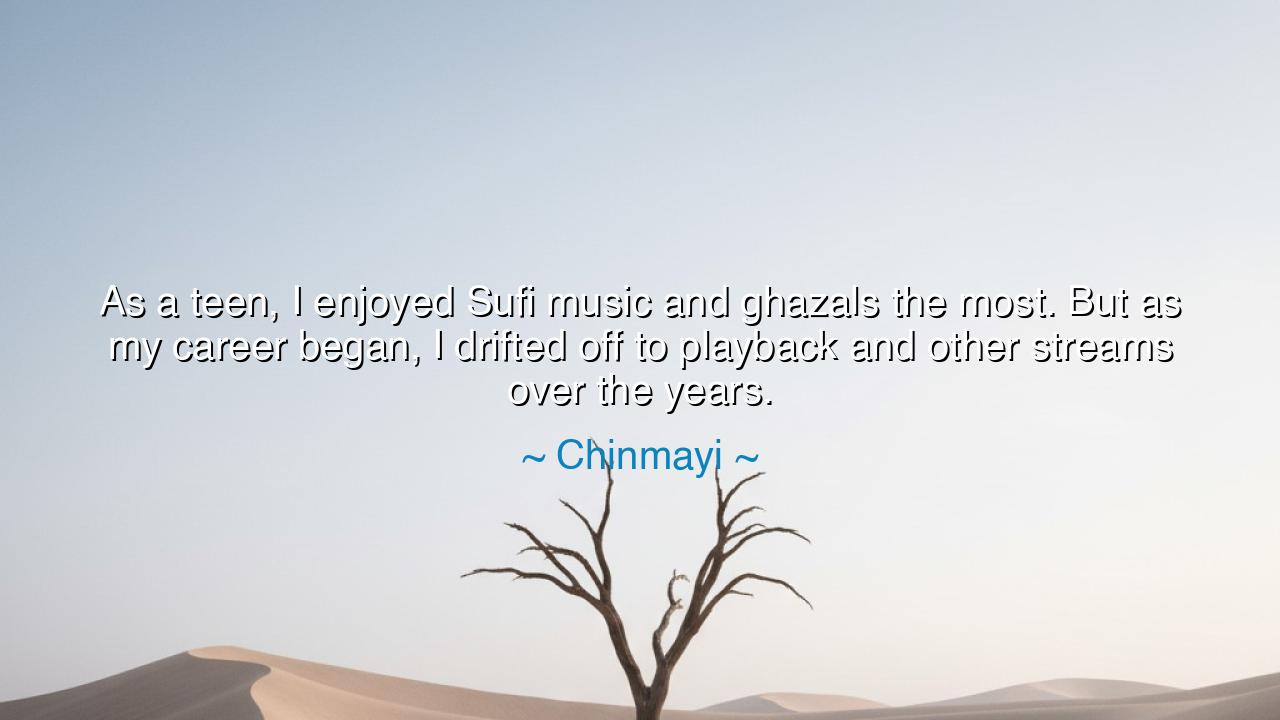
As a teen, I enjoyed Sufi music and ghazals the most. But as my
As a teen, I enjoyed Sufi music and ghazals the most. But as my career began, I drifted off to playback and other streams over the years.






Hear the gentle yet profound confession of Chinmayi, the voice woven into the fabric of Indian cinema, who spoke of her journey: “As a teen, I enjoyed Sufi music and ghazals the most. But as my career began, I drifted off to playback and other streams over the years.” These words, though soft in tone, carry the depth of longing and the weight of truth—that the songs that shape our hearts in youth are not always the songs the world asks of us in our labor.
In her youth, Chinmayi found solace in Sufi music and ghazals, forms born of longing, mysticism, and the eternal search for love both human and divine. Sufi music sings of union with the Eternal, dissolving the self into devotion. Ghazals, with their intricate poetry, speak of love’s ecstasy and agony, the beauty of longing, the nobility of pain. To be touched by such music in one’s tender years is to drink deeply of the cup of spirit. It is no wonder that such songs enchanted her teen soul, for they carry wisdom far older than she, resonating with the eternal in every heart.
Yet when her career began, the tides shifted. The demands of the world, the machinery of cinema, called her into playback singing, where the singer’s voice becomes the breath of another’s story, fitted into the rhythms of industry and the desires of mass audiences. This is no small art—playback is a pillar of modern Indian culture, giving life to films that reach millions. But in confessing that she “drifted off,” Chinmayi reveals a truth known by many: that the calling of the heart and the demands of the profession do not always sing the same melody.
History offers many such stories. Consider Johann Sebastian Bach, who as a young man delighted in complex, deeply spiritual compositions, but often had to write simple courtly dances and church pieces to earn his livelihood. Or think of Rabindranath Tagore, whose pure poetry often had to be shaped into songs for public festivals. The world often asks of the artist one thing, while the soul craves another. And yet both paths, the pure and the pragmatic, shape the fullness of the artist’s journey.
Chinmayi’s words also remind us of the resilience of art within the artist. Though she drifted into playback and “other streams,” the memory of Sufi music and ghazals remains alive within her, like an ember glowing beneath the ash. For what we love in our youth never truly leaves us—it shapes our voice, our choices, our very essence, even when unseen. In every note she sings, one may still hear the shadow of mysticism, the echo of poetry, the hidden soul of the music she once adored.
The deeper meaning of her reflection is this: life is often a dance between passion and necessity. The music of the heart may not always be the music that earns us bread, yet neither path is wasted. To follow the heart in youth, and the profession in adulthood, is not betrayal but balance. For even in the streams of work, the deep waters of passion still flow, nourishing and shaping what the world hears from us.
Therefore, my child, learn this: never despise the work that life demands of you, but never forget the songs that once stirred your soul. Let both live within you. The world may call you to one kind of labor, but your heart may still return in quiet moments to the music of your youth. Keep that fire alive, and in time, it may find its way back into your work, blending the practical with the eternal.
So let Chinmayi’s words endure: “As a teen, I enjoyed Sufi music and ghazals... but I drifted off to playback.” May you too remember the music of your own beginnings, even as you walk through the demands of life. For the greatest art, and indeed the greatest life, is woven from both—the song of the heart and the song of the world, joined into one harmony.






AAdministratorAdministrator
Welcome, honored guests. Please leave a comment, we will respond soon